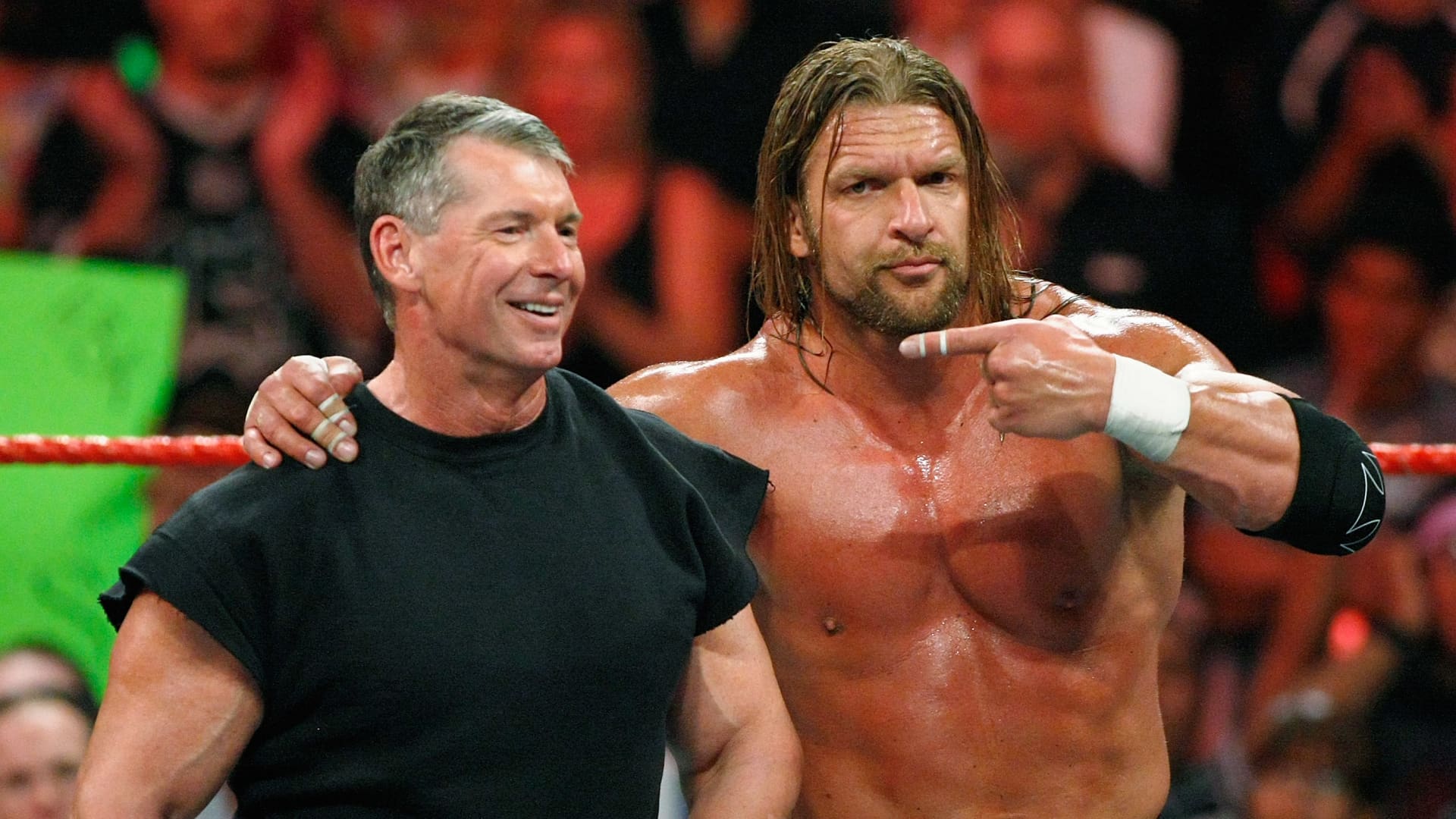World Wrestling Entertainment‘s annual report for 2021 lists a risk factor specifically about the consequences of Vince McMahon’s retirement — an event that happened last week.
“The unexpected loss of the services of Vincent K. McMahon could adversely affect our ability to create popular characters and creative storylines or could otherwise adversely affect our operating results,” WWE wrote in the corporate filing, dated Dec. 31. “The loss of Mr. McMahon due to unexpected retirement, disability, death or other unexpected termination for any reason could have a material adverse effect on our ability to create popular characters and creative storylines or could otherwise adversely affect our operating results.”
That sounds bad for WWE shareholders. So, what happened to WWE shares when McMahon announced his unexpected retirement after the bell Friday? They shot higher, rising more than 8% Monday.
The spike was driven by heightened investor sentiment that a sale is coming. Newly appointed co-CEO Nick Khan openly discussed the concept of selling already this year, months before McMahon stepped down amid a Wall Street Journal investigation that revealed payouts to women who claimed sexual misconduct and infidelity. The WWE has since confirmed $14.6 million in previously unrecorded expenses paid personally by McMahon.
“As we say, we’re open for business,” Khan said in March on The Ringer’s “The Town” podcast.
Potential buyers
The timing of a deal could hinge on the WWE’s upcoming U.S. TV rights renewal, loosely scheduled for mid-2023. An acquirer may decide it makes more sense to buy the company than strike a temporary rights deal. Fox owns the rights to “Smackdown” and NBCUniversal owns the rights to “Raw,” the two WWE TV properties. The deals both end in the fourth quarter of 2024.
Speaking to Matthew Belloni of “The Town,” Khan singled out Comcast‘s NBCUniversal as a potential buyer. NBCUniversal’s Peacock currently owns the exclusive live streaming rights for WWE.
“If you look at what does NBCU/Comcast lack that they need, and I think it’s a factual statement, they don’t have the intellectual property that some other companies have. They certainly don’t have the Disney treasure trove of IP, nor should they,” said Khan. “I think they look at us as an entity that has a treasure trove of intellectual property. A lot of it has not been exploited yet….Now it’s up to us to monetize it properly and show the community exactly what we have.”
Global media companies are on the hunt for intellectual property they can use as the basis for recurring TV series and films and theme park attractions, for those that own them. WWE is also attractive as an acquisition because a media owner can sell real-time advertising on live programming and potentially keep audiences paying for traditional pay-TV, a diminishing but lucrative revenue stream. WWE’s “Raw” currently airs on USA Network, an NBCUniversal cable network. To compare, the National Football League nearly doubled its projected TV revenue in its most recent rights renewal deal last year.
WWE has consistently grown annual revenue through the last decade on the strength of its media deals and live events. It announced Monday second-quarter revenue is currently expected at $328 million for the quarter, up 23% from a year ago, with operating income of about $70 million, a 52% increase from a year earlier.
There aren’t many entertainment companies with global scale that come up for sale with an easily digestible price tag for many potential suitors. WWE isn’t engaged in sale talks, according to a person familiar with the matter. But McMahon’s retirement may open the flood gates on offers that could be too good for the company to turn down. WWE, whose shares have climbed about 40% this year contrary to broader stock declines, has a market valuation of about $5 billion. The stock closed down more than 3% on Tuesday, after The Wall Street Journal reported McMahon’s payments were being investigated by federal authorities.
Comcast, Disney, Warner Bros Discovery, Paramount Global, Apple, Amazon and Netflix all make sense an acquirer, given their streaming ambitions, MKM Partners analyst Eric Handler wrote in a note to clients.
A WWE spokesperson declined to comment.
Jumping the gun?
It’s also possible that the new executive leadership – Khan; co-CEO and McMahon’s daughter Stephanie McMahon; Stephanie’s husband, Paul “Triple H” Levesque – will see this as a time to reform WWE.
While it strains credulity to think that Vince McMahon, still the biggest shareholder in WWE, won’t be involved in the company’s major decisions, Levesque, who took over creative control from McMahon, may have an opportunity to freshen storylines and introduce new talent. McMahon, who turns 77 in August, no longer has any executive title at the company.
McMahon may also view selling now as moving out of weakness, which he may see as antithetical to his public persona as someone who is always in charge.
“We suspect the Street will interpret Mr. McMahon’s retirement as a precursor to an eventual sale of WWE,” Citi analyst Jason Bazinet said in a note to clients. “We’re not sure that is a reasonable conclusion since WWE will still be a controlled company with 100% of the Class B shares held by the McMahon family.”
Disclosure: Comcast is the parent company of NBCUniversal, which owns CNBC.
